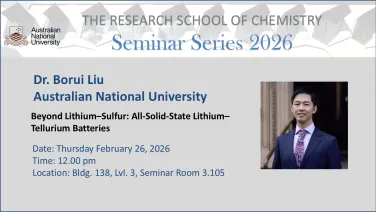RSC School Seminar - Prof. Tim Connell
Embracing the Dark Side of Photorexox Catalysis
Speakers
Event series
Content navigation
Description

Embracing the Dark Side of Photoredox Catalysis
Visible light photoredox catalysis promises a sustainable approach for tackling challenging synthetic problems, including carbon-carbon bond formation, late-stage functionalization and solar fuels. The photocatalysts (PC) that power these reactions absorb light to form an excited state, followed by electron-transfer with a suitable donor (D) or acceptor (A) to produce potent single electron reductants and oxidants.
Whilst primarily selected based on ground and excited state properties, catalyst activity is intrinsically tied to the nature of these open-shell redox intermediates. Productive reactions require dissociation of the charge-separated encounter complex formed immediately following electron-transfer; in a reductive quenching cycle this comprises reduced photocatalyst and oxidized electron donor (e.g. [PC•–:D•+]). Charge recombination is energetically favoured but non-productive, regenerating the catalyst and donor ground state but drastically lowering the photochemical quantum yield.
Measuring these short-lived intermediates and charge recombination is challenging, and these processes are often assumed to occur with high efficiency. We show how sacrificial donors play a critical role in controlling reaction efficiency, and may lead to significant improvements in rate, yield and atom economy. These results will direct the design of improved photocatalytic systems ready for industrial scaling.
Biography
Tim completed his PhD at the University of Melbourne in 2015 supervised by Prof. Paul Donnelly. Following postdoctoral appointments at CSIRO and RMIT University, he was awarded a 2019 Fulbright Future Scholarship, working with Prof. Stefan Bernhard at Carnegie Mellon University. Tim started his independent career as an Australian Research Council DECRA Fellow at Deakin University (Australia) in 2021, where he is now a Senior Lecturer in Chemistry. His research program focuses on the interaction of light and matter, and particularly the photocatalytic conversion of light into chemical energy. Recent recognition of his research includes the 2022 Royal Australian Chemical Institute’s Organometallic Prize and the 2023 Young Scientist Prize from the Asian and Oceanian Photochemistry Association.
Location
Bldg. 138, Lvl. 3, Seminar Room 3.105

